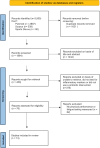"Do probiotics mitigate GI-induced inflammation and perceived fatigue in athletes? A systematic review"
- PMID: 39193818
- PMCID: PMC11360638
- DOI: 10.1080/15502783.2024.2388085
"Do probiotics mitigate GI-induced inflammation and perceived fatigue in athletes? A systematic review"
Abstract
Background: Fatigue and gastrointestinal (GI) distress are common among athletes with an estimated 30-90% of athletes participating in marathons, triathlons, or similar events experiencing GI complaints. Intense exercise can lead to increased intestinal permeability, potentially allowing members of the gut microbiota to permeate into the bloodstream, resulting in an inflammatory response and cascade of performance-limiting outcomes. Probiotics, through their capacity to regulate the composition of the gut microbiota, may act as an adjunctive therapy by enhancing GI and immune function while mitigating inflammatory responses. This review investigates the effectiveness of probiotic supplementation on fatigue, inflammatory markers, and exercise performance based on randomized controlled trials (RCTs).
Methods: This review follows the Preferred Reporting Items for Systematic Reviews and Meta-Analysis (PRISMA) guidelines and PICOS (Population, Intervention, Comparison, Outcome, Study design) framework. A comprehensive search was conducted in Sportdiscus, PubMed, and Scopus databases, and the screening of titles, abstracts, and full articles was performed based on pre-defined eligibility criteria. Of the 3505 records identified, 1884 were screened using titles and abstracts, of which 450 studies were selected for full-text screening. After final screening, 13 studies met the eligibility criteria and were included for review. The studies contained 513 participants, consisting of 351 males and 115 females, however, two studies failed to mention the sex of the participants. Among the participants, 246 were defined as athletes, while the remaining participants were classified as recreationally active (n = 267). All trials were fully described and employed a double- or triple-blind placebo-controlled intervention using either a single probiotic strain or a multi-strain synbiotic (containing both pro- and pre-biotics).
Results: This review assesses the effects of daily probiotic supplementation, ranging from 13 to 90 days, on physical performance and physiological markers in various exercise protocols. Ten studies reported improvements in various parameters, such as, enhanced endurance performance, improved anxiety and stress levels, decreased GI symptoms, and reduced upper respiratory tract infections (URTI). Moreover, despite no improvements in maximal oxygen uptake (VO2), several studies demonstrated that probiotic supplementation led to amelioration in lactate, creatine kinase (CK), and ammonia concentrations, suggesting beneficial effects on mitigating exercise-induced muscular stress and damage.
Conclusion: Probiotic supplementation, specifically at a minimum dosage of 15 billion CFUs daily for a duration of at least 28 days, may contribute to the reduction of perceived or actual fatigue.
Keywords: Exercise; Fatigue; Gut; Microbiome; Probiotic.
Conflict of interest statement
No potential conflict of interest was reported by the authors.
Figures
References
-
- Jakob Andersen J. Marathon statistics 2019 worldwide. 2019. [cited 2023 Jun 21]. Available from: https://runrepeat.com/research-marathon-performance-across-nations
Publication types
MeSH terms
LinkOut - more resources
Full Text Sources
Medical
Molecular Biology Databases
Research Materials
Miscellaneous

